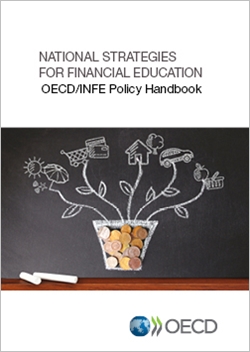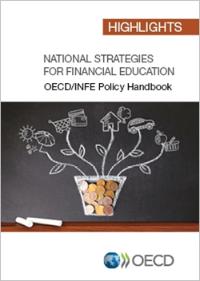Financial education and consumer protection
National Strategies for Financial Education: OECD/INFE Policy Handbook
|
Date of publication:
|
POLICIES TO ENHANCE FINANCIAL LITERACY Financial literacy has become a key life skill for individuals as well as micro and small businesses. Today, 59 economies worldwide are implementing national strategies using guidance from the OECD/INFE High-level Principles on National Strategies for Financial Education. The Policy Handbook describes the experiences of these economies and addresses challenges that countries have faced in implementing the Principles. > Download the full text (pdf) > Download the highlights booklet (pdf) > Download the comparative tables (pdf)
BACKGROUND Within a fast evolving financial landscape where access to financial services is made easier while more risks are being transferred to citizens, financial literacy has become a key life skill for individuals as well as micro and small businesses. Financial education can help enhance financial literacy by increasing financial knowledge, skills and attitudes. In turn, this can contribute to individuals’ (including vulnerable and low income) participation in financial, economic and social life, as well as to their financial well-being. As a complement to financial inclusion and financial consumer protection, financial education is also important to restore confidence and trust in financial markets, and can support financial stability.
G20 Leaders have recognised the important role of financial education policies notably by endorsing in 2012 the OECD/INFE High-level Principles on National Strategies for Financial Education. These Principles provide international guidance to policy makers with a view to developing evidence-based and co-ordinated and tailored approaches to financial education, both in emerging markets and more advanced economies. The Policy Handbook responds to a call by G20 Leaders to the OECD/INFE in September 2013 and complements the Principles by supporting their implementation in interested countries. |
Related Documents

